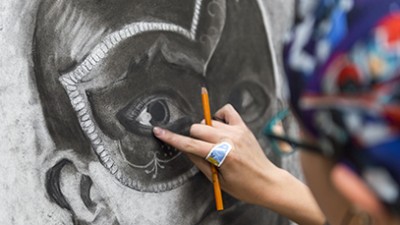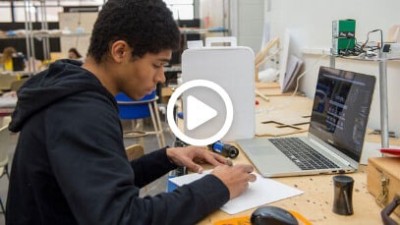
Mary Golden
Associate Professor
Mary Golden
Associate Professor
Education
BA, M.Arch., University at Buffalo
Bio
Associate Professor and Undergraduate Program Director for the BFA, Interior Design program at Rochester Institute of Technology. Mary she teaches, leads and performs research in the Council for Interior Design Accredited program. She is a professional interior designer and is certified by the National Council for Interior Design through qualification exam and required practice.
In her research investigations Mary places emphasis on fostering agency and self-reliance through human centered design-build projects that address critical global issues advancing the right of every person to live in a socially, economically, and environmentally just community. Mary’s scholarship creates faculty-student-stakeholder partnerships across campuses and borders, most notably in RIT Hope for Honduras, a multidisciplinary effort that she has directed since 2017. RIT Hope for Honduras, a campus wide initiative, aims to assist in-country partners with reducing infant mortality through design and technology solutions. Grounded in the principles of universal design, Mary’s research seeks to create healing types of architecture and interior environments while enacting global citizenry in students. Conceptually inspired from her personal practice, and developed through collaborative faculty-student research, the MObile KItchen (MO:KI) affords flexibility in organizing a cooking environment responsive to the needs of the home chef, regardless of age, stature, and ability. The prototypes are currently in research and development at RIT’s LiveAbility Lab, where Mary is an affiliated faculty.
Professionally, Mary has eighteen years of design experience, across multiple bioregions. She established the first company in Western New York, Gaiatecture Design Studio (now Mary Golden | Design Studio), after graduating in 2002 with a master’s degree in Architecture from the University at Buffalo merging innovative architectural and interior solutions with natural building practices. The company specialized in natural building technologies and clay finish plasters and evolved in 2013 to include sustainable, custom interiors and hybrid projects that integrated mainstream materials and ecological systems. Interior design services focused on high end custom residential, small scale commercial, retail and restaurant clientele.
Select Scholarship
Hope for Honduras Research Website: https://www.rit.edu/hopeforhonduras/
MO:KI Research Website: https://www.rit.edu/moki/
Currently Teaching
In the News
-
February 2, 2024

Students lean into technology and design to improve the environment
Students in Campus Ecology explored how culture, art, science, and design influence their views and understandings of nature. They also discussed how interdisciplinary collaboration and leaning into the intersection of technology, the arts, and design could improve communication and understanding of ecological concepts and sustainability goals.
-
September 23, 2022

Neonatal ambulance hits ground in Honduras
After five years of collaboration and production, the neonatal transport ambulance designed by RIT’s Hope for Honduras team has hit the ground in Honduras. The ambulance will help save countless young lives by greatly enhancing medical access to neonatal care for those living in rural areas of the country.
-
August 24, 2022
Student project inspires redesign of Rochester library's 'Secret Room'
The Central Library of Rochester and Monroe County’s historic Secret Room received a wall-to-wall makeover based on a design package by a team of interior design students.
Featured Work
Residential Design
Mary Golden
Peace. Relaxation. Nature Inspired by the serene fifty acre site the client, a stone sculptor and landscape designer, requested that the interior of his home exude the same tranquility as the...
Hospitality Design
Mary Golden
Palette and finish selections for entry, lobby, residence halls and public spaces in downtown loft revitalization project.
Contract Design
Mary Golden








